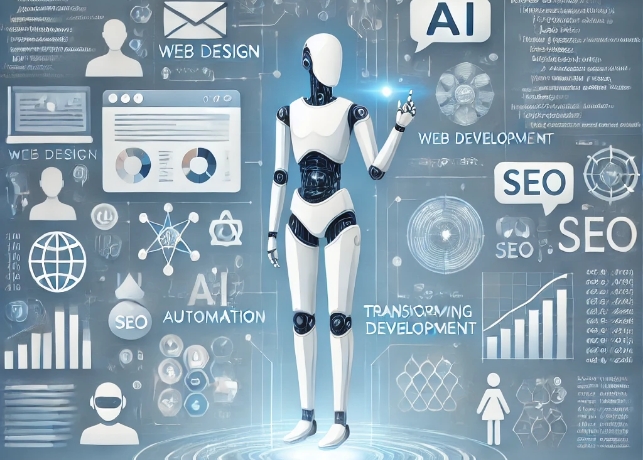Artificial Intelligence (AI) is rapidly reshaping web development, enabling faster workflows, enhanced user experiences, and smarter automation. As businesses and developers adapt to a more tech-driven era, AI offers transformative tools and capabilities that redefine the way websites are designed, built, and maintained.
1. Streamlined Design and Prototyping
AI-powered tools like Figma’s auto-layout and Adobe’s Sensei are revolutionizing the design process. These tools analyze user preferences and automatically generate layout suggestions, color palettes, and design elements. This reduces manual effort and allows developers to focus on creativity while ensuring user-centric designs.
2. AI-Driven Code Generation
AI assistants, such as GitHub Copilot, are changing the way developers write code. By analyzing natural language inputs, these tools suggest code snippets, complete functions, and even debug errors. This accelerates development time and minimizes repetitive tasks, allowing developers to tackle more complex challenges.
3. Intelligent Personalization
AI enables websites to provide personalized experiences by analyzing user behavior. From product recommendations to dynamic content delivery, tools powered by machine learning ensure that each visitor engages with content tailored to their preferences. This boosts engagement, conversion rates, and user satisfaction.
4. Advanced Chatbots and Support Systems
Customer support is now more efficient with AI-powered chatbots. These bots, integrated into websites, use Natural Language Processing (NLP) to answer queries, guide users, and handle transactions in real time. Examples like ChatGPT and IBM Watson are leading this revolution, reducing dependency on human operators and offering 24/7 assistance.
5. Predictive Analytics and Insights
AI tools analyze vast amounts of data to provide actionable insights. For instance, Google Analytics’ AI features predict user behavior, identify trends, and recommend strategies for improvement. Developers and businesses can leverage this data to optimize performance and content strategies effectively.
6. Automated Testing and QA
AI-driven testing tools like Selenium and Testim automate testing processes, identifying bugs and performance issues faster than manual testing. By simulating user behavior across devices, these tools ensure websites remain robust and user-friendly.
7. Enhanced SEO and Content Optimization
AI is revolutionizing search engine optimization (SEO) by helping developers create content optimized for visibility. Tools like MarketMuse and Clearscope analyze top-performing pages and suggest content improvements. AI algorithms also adjust meta tags, headings, and image descriptions to align with search trends.
8. Voice Search and Conversational Interfaces
With the rise of voice-activated devices like Alexa and Siri, AI enables web developers to integrate voice search and conversational interfaces. This expands accessibility and aligns with user behavior trends, creating futuristic interactions for website visitors.
9. Cybersecurity Enhancements
AI tools detect anomalies and predict security threats in real time, ensuring safer websites. Machine learning models can identify patterns in cyberattacks and automatically deploy countermeasures, safeguarding sensitive user data and preventing downtime.
The Road Ahead: A Collaborative Future
AI isn’t replacing web developers—it’s augmenting their capabilities. By automating repetitive tasks, providing intelligent insights, and fostering innovation, AI empowers developers to create smarter, faster, and more user-centric websites.
As we embrace this technological evolution, businesses that leverage AI in web development will stay ahead of the curve, delivering unparalleled user experiences and achieving greater efficiency.
Ready to explore AI-driven web development? Start integrating these AI solutions today to future-proof your digital presence.


发表回复